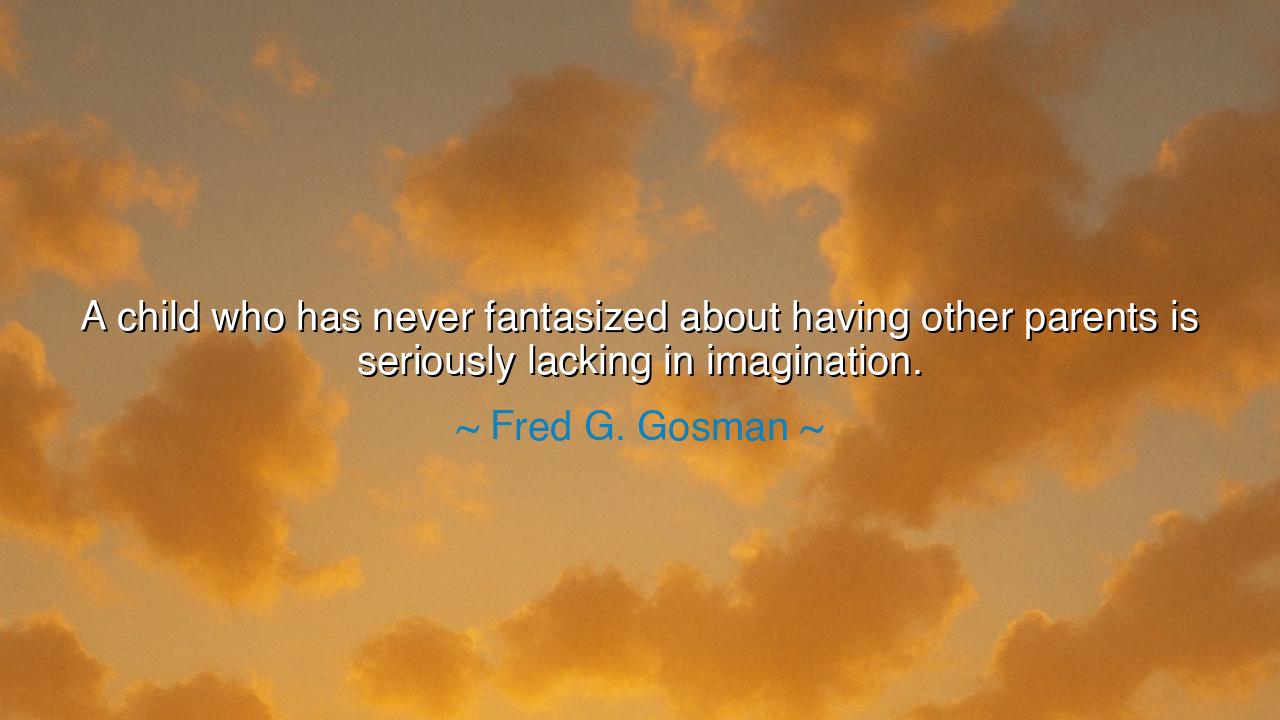
A child who has never fantasized about having other parents is
A child who has never fantasized about having other parents is seriously lacking in imagination.






"A child who has never fantasized about having other parents is seriously lacking in imagination." These words from Fred G. Gosman reveal a profound truth about the nature of childhood and the vast realm of imagination that lies within every young mind. Gosman suggests that the act of fantasizing, of dreaming up alternate realities, is not just a trivial passing thought but a vital exercise in creativity and self-reflection. To imagine what could be different, to picture the world through different eyes, is a way for children (and for us all) to explore the boundaries of possibility and experience the world through a lens of freedom and wonder. In this sense, imagination is not merely a means of escape, but a tool for growth and understanding.
In the ancient world, the idea of fantasy and imagination was not seen as an escape from reality, but as an essential part of human nature. The Greeks held that imagination could transcend the physical world, allowing the mind to explore the divine and the mysterious. In their myths, the gods themselves were embodiments of the imagination, often intervening in the lives of mortals and reshaping the world in ways that defied logic or reason. Homer, in his epic Iliad and Odyssey, filled the world with fantastical creatures, gods, and heroes—imagination that invited listeners to see beyond the world as it was, and to explore the eternal questions of life, love, and fate. Gosman’s words mirror this ancient perspective, suggesting that the child’s imagination is just as vital—it is the key to exploring the world’s infinite possibilities and discovering new realities.
Consider the story of Socrates, whose method of questioning and dialogue opened new doors of understanding for his students. Socrates did not accept the world as it appeared but challenged his followers to think beyond the obvious, to imagine new ways of being, of living, and of knowing. His philosophical explorations encouraged individuals to question their own lives and perceptions, to see beyond the limits of their current circumstances and to imagine possibilities that others had not yet conceived. This power of imagination, grounded in curiosity and self-reflection, is precisely what Gosman speaks to—the ability to look beyond what is and to imagine what could be. The child who wonders about having different parents is, in essence, exploring a world of different possibilities, a world where new choices could bring new insights.
In the modern world, children continue to use imagination in profound ways. Take, for example, the playful act of a child dressing up as a superhero or a queen, stepping into a role of greatness and power. This act is not a mere fantasy for fun, but an essential exercise in empowerment and self-expression. The child imagines themselves as something more, something different, and in doing so, they practice stepping outside their immediate reality and embracing new roles, ideas, and possibilities. In this process, imagination is not only a form of entertainment, but a means of growth, allowing children to explore the full spectrum of human experience.
Imagination, however, is not restricted to children alone. Consider Albert Einstein, whose breakthroughs in theory were fueled by his ability to visualize complex scientific principles in his mind, without the aid of physical experimentation. Einstein's imagination led him to envision new dimensions of reality, to conceive of time and space as fluid, and to revolutionize our understanding of the universe. His imagination allowed him to think beyond the present, to dream of a world that had not yet been discovered. Just as Gosman suggests that a child who has never fantasized about other parents is lacking in imagination, so too can adults lose their ability to imagine new possibilities, new solutions, and new ways of being.
The lesson here is one of nurturing imagination—not just in children, but in ourselves as we grow older. To fantasize about different possibilities is not an act of rebellion or discontent, but an act of creative engagement with the world around us. Imagination is the spark that drives innovation, change, and growth, and it is essential for a healthy, vibrant mind. We must not allow the constraints of daily life to stifle this vital force. Whether in art, science, or personal growth, the ability to imagine new realities is what allows us to transcend the ordinary and move toward the extraordinary.
Thus, let us encourage both ourselves and the children around us to embrace imagination without limits. Just as the ancient philosophers used imagination to question and explore, so must we cultivate this powerful tool to open new doors, to expand our horizons, and to dream of the world as it could be. Let us allow our minds to wander, to envision different possibilities, and to create a future that is shaped not by the limitations of today, but by the boundless potential of what could be. Just as Socrates dared to imagine new ways of thinking, so too can we dare to imagine new ways of living. The world is shaped by the dreams we dare to have, and in this, imagination is not just a child’s pastime—it is the essence of all human progress.






AAdministratorAdministrator
Welcome, honored guests. Please leave a comment, we will respond soon